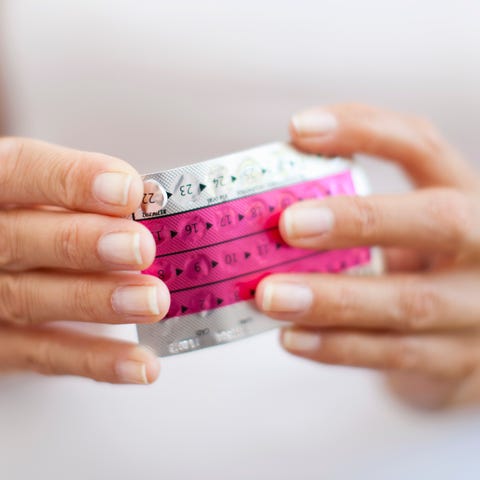Can I Use Diet Pills While on Birth Control
Whether you've taken birth control pills for years or are thinking about starting, you probably know that oral contraceptives help keep you from getting pregnant.
What you may not know is how, exactly. In a nutshell, combination pills use the hormones progestin and estrogen to stop your ovaries from releasing an egg each month. Progestin-only pills, on the other hand, thicken your cervical mucus, making it harder for sperm to get into your uterus. Interesting, right?
If you're shaking your head yes, you're in luck! There are a ton of other seriously interesting facts you probably didn't know about the contraceptive—from unexpected benefits to the weird things that might make it less effective.
Here are six surprising nuggets of info that are definitely worth getting on your radar.
1. They can make your periods more comfortable

LaylaBird Getty Images
The hormones in oral contraceptives work to prevent pregnancy. (Duh.) But they have the added perk of moderating miserable period symptoms, says Kecia Gaither, MD, FACOG, the director of perinatal services at NYC Health + Hospitals/Lincoln.
In addition to easing heavy bleeding, the pill can help keep period cramps at bay, fight acne, and even work to stave off menstrual migraines. (#winning)
2. Some meds might make your pills less effective

shapecharge Getty Images
Experts know that antibiotics like griseofulvin (an antifungal used to treat things like ringworm and athlete's foot) and rifampicin (an antibiotic used to treat various infections) can keep BC pills from working properly, and evidence suggests other types of antibiotics might do the same.
Why? "Antibiotics can increase the activity of liver enzymes that metabolize certain pills, including birth control pills," explains Daniel Kort, MD, FACOG, Associate Medical Director of Neway Fertility in Manhattan. The pills can get broken down faster than normal. As a result, it could cause a lapse in protection.
That said, if you have to take antibiotics while on the pill, play it safe by using condoms or another form of backup contraception.
3. They can lower your risk for some diseases

UpperCut Images Getty Images
Oral contraceptives seem to play a role in helping to prevent some cancers. Women who've taken the pill are up to 50 percent less likely to get ovarian cancer; at least 30 percent less likely to get endometrial cancer; and up to 20 percent less likely to get colorectal cancer, according to the National Cancer Institute.
And that's not all. Taking the pill seems to lower the risk for rheumatoid arthritis by as much as 19 percent, a recent Swedish study found. And because the pill reduces blood loss caused by heavy periods, it can help prevent iron deficiency anemia, too.
4. If you have insurance, they're probably free

PhotoAlto/Frederic Cirou Getty Images
The Affordable Care Act requires health insurance plans to cover the cost of contraceptives like birth control pills, so there's no co-pay. And if you don't have insurance? You might still be able to get free or low-cost pills from family planning clinics, according to the U.S. Department of Health & Human Services.
5. You don't have to take a break from them

PhotoAlto/Antoine Arraou Getty Images
Ever hear that thing about long-term pill use being bad for you? Some natural health influencers warn that taking oral contraceptives for years on end could wreak havoc on your fertility. Except… it's not true.
"One doesn't need to take a break from oral contraceptive use unless one wants to," Dr. Gaither says. If and when you decide you're ready to try getting pregnant, talk with your doctor about when you should stop taking your pills.
6. You can take them strategically to skip your period altogether

Tassii Getty Images
Yup, you read that right. Most monthly pill packs contain 21 active pills with hormones and seven placebo ones. Users get their period during the week of placebo pills—but if you skip those pills and move right onto the next pack, you'll skip your period.
Findings show this is totally safe, btw, and it can deliver a dose of relief for women with endometriosis or painful periods. The only downside is that you might be more prone to spotting in between periods, Dr. Gaither says.
Marygrace Taylor Marygrace Taylor is a health and wellness writer for Prevention, Parade, Women's Health, Redbook, and others.
This content is created and maintained by a third party, and imported onto this page to help users provide their email addresses. You may be able to find more information about this and similar content at piano.io
Can I Use Diet Pills While on Birth Control
Source: https://www.womenshealthmag.com/health/a26726013/birth-control-pill-facts/
0 Response to "Can I Use Diet Pills While on Birth Control"
Post a Comment